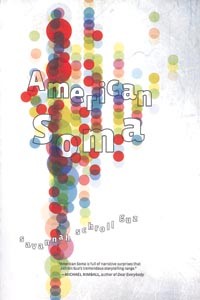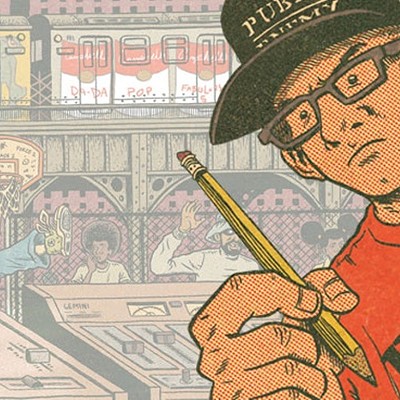American Soma
By Savannah Schroll Guz
So New Publishing, 163 pp., $10
Frequently in the short stories in American Soma, Savannah Schroll Guz describes a near-future just slightly distinct from our present.
It's a fallen world where a government surreptitiously drugs the people into compliant bliss, and hormones in the water scramble human genitalia. In one story, a loner plans to end the world. In another, the world seems about ready to end on its own.
Characters in stories apparently set in the present fare minimally better. A middle-aged man in a torpid marriage dreams of dissecting his wife. Bureaucracies and corporations conspire to stamp out Third World cultures. A man who (in one story) dreams of examining the bones of mankind's evolutionary forebears is (in the next) barred from the museum because he has become -- inexplicably, even to himself -- a bedraggled street person.
But while Guz sets the tone with stories that eye our prospects as a species warily, these don't comprise the whole of American Soma. Guz, a West Virginia-based writer (and occasional CP art reviewer), is indeed perhaps most ambitious in the range of subject matter, forms and even genres she tackles.
Her cautionary science fiction sits alongside "Patent Leather Sidewalk Evangelist," a bitingly ironic story that recalls Flannery O'Connor. The humanistic fantasy of "The Fountain" -- filthy tavern toilet springs the fountain of youth -- contrasts with the quietly chilling "Secret Convexity," about a young woman's descent into depression. Guz even offers a few short, funny epistolary pieces, including "A Salesman Reborn," a kiss-off to a boss that suggests something from George Saunders' oeuvre.
Still, Guz has default settings. Typically, she's analytical, even clinical. "Cartoons ran before her eyes and stimulated the muscles of her iris and pupil," she writes of one character. A rich old man has not arthritis but rather "progressive rheumatoid disfigurement." There's some suggestion that biology is destiny.
Yet Guz is no determinist: American Soma also surprises with weird doses of supernatural retribution, and even with "North American Twilight," which describes a looming, Biblical doomsday via a socialite, an oil man and a mysterious old woman. (It's a bit pulpy, but a page-turner.)
Indeed, sometimes Guz even seems to combine two sensibilities in one story. "Evolution" -- the one about waterborne hormones undermining male DNA -- creates an unsettling tension between the coolly satirical and the earnestly elegiac. Even as Guz imagines editorial writers sentiously explaining "Why the Y is Under Assault," she notes the human fallout: "The women told themselves the difference in their men did not matter, but it did. It made us what we are now."
As a stylist, Guz occasionally goes purple. Of a dark Great Plains night, for instance, she writes, "all was stygian scintillation." And why write "cameras promulgate falsehoods" instead of the serviceable if familiar "cameras lie"?
Still, she often scores with smart details -- a creepy street preacher's "impractically long index finger" -- and keen metaphors. "A gutter of unwanted knowledge brimmed and flooded his world," she writes of a little boy watching his parents fight over his physical abnormality.
And even when she's not speaking in her characters' voices, Guz has a facility for getting inside their heads. In "A Horizontal Plane," a man on the edge sits with his rifle, waiting.
He tuned the intensity of his concentration to the sound of the clock itself, and gazed into an imaginary tunnel of its resonance. It was the perfect sound of isolation and emptiness, the echoing reminder of unlived time.
For a collection that's hard to categorize, that scene is itself a working metaphor, describing a place where unease about what's within oneself is indistinguishable from disgust with what's without.















